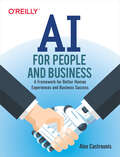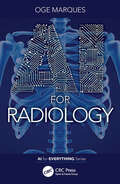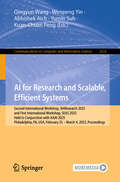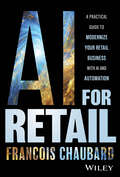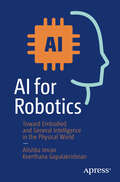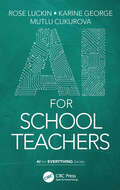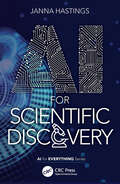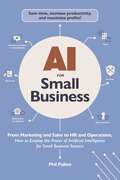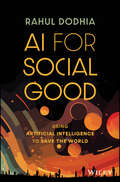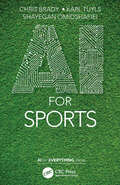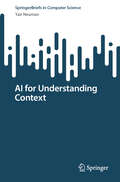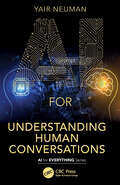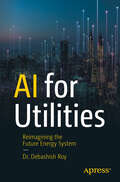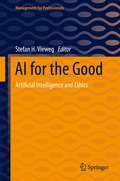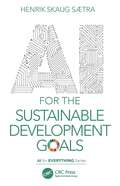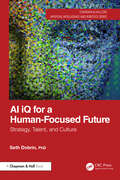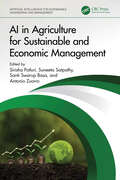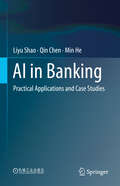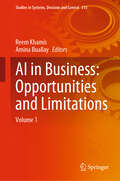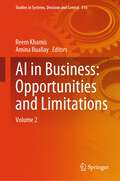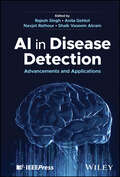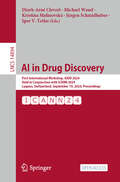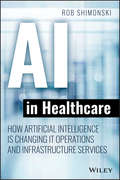- Table View
- List View
AI for People and Business: A Framework for Better Human Experiences and Business Success
by Alex CastrounisIf you're an executive, manager, or anyone interested in leveraging AI within your organization, this is your guide. You'll understand exactly what AI is, learn how to identify AI opportunities, and develop and execute a successful AI vision and strategy. Alex Castrounis,founder and CEO of Why of AI, Northwestern University Adjunct, advisor, and former IndyCar engineer and data scientist, examines the value of AI and shows you how to develop an AI vision and strategy that benefits both people and business.AI is exciting, powerful, and game changing--but too many AI initiatives end in failure. With this book, you'll explore the risks, considerations, trade-offs, and constraints for pursuing an AI initiative. You'll learn how to create better human experiences and greater business success through winning AI solutions and human-centered products.Use the book's AIPB Framework to conduct end-to-end, goal-driven innovation and value creation with AIDefine a goal-aligned AI vision and strategy for stakeholders, including businesses, customers, and usersLeverage AI successfully by focusing on concepts such as scientific innovation and AI readiness and maturityUnderstand the importance of executive leadership for pursuing AI initiatives"A must read for business executives and managers interested in learning about AI and unlocking its benefits. Alex Castrounis has simplified complex topics so that anyone can begin to leverage AI within their organization." - Dan Park, GM & Director, Uber"Alex Castrounis has been at the forefront of helping organizations understand the promise of AI and leverage its benefits, while avoiding the many pitfalls that can derail success. In this essential book, he shares his expertise with the rest of us." - Dean Wampler, Ph.D., VP, Fast Data Engineering at Lightbend
AI for People, Democratizing AI: Second EAI International Conference, CAIP 2023, Bologna, Italy, November 24-26, 2023, Proceedings (Lecture Notes of the Institute for Computer Sciences, Social Informatics and Telecommunications Engineering #591)
by Giovanni Sartor Marta Ziosi João Miguel Cunha Angelo Trotta Philipp WickeThis book constitutes the refereed post-conference proceedings of the Second EAI International Conference on AI for People, Democratizing AI, CAIP 2023, held in Bologna, Italy, during November 24-26, 2023. The 11 regular papers were carefully reviewed and selected from 27 submissions. The papers are organized in thematic sessions on ethical AI and innovation; democratization of AI and governance; AI in society and legal aspects; and data privacy and technology ethics.
AI for Physics (AI for Everything)
by Volker KnechtWritten in accessible language without mathematical formulas, this short book provides an overview of the wide and varied applications of artificial intelligence (AI) across the spectrum of physical sciences. Focusing in particular on AI's ability to extract patterns from data, known as machine learning (ML), the book includes a chapter on important machine learning algorithms and their respective applications in physics. It then explores the use of ML across a number of important sub-fields in more detail, ranging from particle, molecular and condensed matter physics, to astrophysics, cosmology and the theory of everything. The book covers such applications as the search for new particles and the detection of gravitational waves from the merging of black holes, and concludes by discussing what the future may hold.
AI for Radiology (AI for Everything)
by Oge MarquesArtificial intelligence (AI) has revolutionized many areas of medicine and is increasingly being embraced. This book focuses on the integral role of AI in radiology, shedding light on how this technology can enhance patient care and streamline professional workflows. This book reviews, explains, and contextualizes some of the most current, practical, and relevant developments in artificial intelligence and deep learning in radiology and medical image analysis. AI for Radiology presents a balanced viewpoint of the impact of AI in these fields, underscoring that AI technologies are not intended to replace radiologists but rather to augment their capabilities, freeing professionals to focus on more complex cases. This book guides readers from the basic principles of AI to their practical applications in radiology, moving from the role of data in AI to the ethical and regulatory considerations of using AI in radiology and concluding with a selection of resources for further exploration. This book has been crafted with a diverse readership in mind. It is a valuable asset for medical professionals eager to stay up to date with AI developments, computer scientists curious about AI’s clinical applications, and anyone interested in the intersection of healthcare and technology.
AI for Research and Scalable, Efficient Systems: Second International Workshop, AI4Research 2025, and First International Workshop, SEAS 2025, Held in Conjunction with AAAI 2025, Philadelphia, PA, USA, February 25–March 4, 2025, Proceedings (Communications in Computer and Information Science #2533)
by Kuan-Chuan Peng Wenpeng Yin Qingyun Wang Abhishek Aich Yumin SuhThis book constitutes the proceedings of the Second International Workshop, AI4Research 2025, and First International Workshop, SEAS 2025, which were held in conjunction with AAAI 2025, Philadelphia, PA, USA, during February 25–March 4, 2025. AI4Research 2025 presented 8 full papers from 35 submissions. The papers covered diverse areas such as agent debate evaluation, taxonomy expansion, hypothesis generation, AI4Research benchmarks, caption generation, drug discovery, and financial auditing. SEAS 2025 accepted 7 full papers from 17 submissions. These papers explore the efficiency and scalability of AI models.
AI for Retail: A Practical Guide to Modernize Your Retail Business with AI and Automation
by Francois ChaubardThe coming of the AI revolution in brick-and-mortar retail In AI for Retail: A Practical Guide to Modernize Your Retail Business with AI and Automation, Francois Chaubard, AI researcher and retail technology CEO, delivers a practical guide for integrating AI into your brick-and-mortar retail business. In the book, you’ll learn how to make your business more efficient by automating inventory management, supply chain, front-end, merchandising, pricing, loss prevention, e-commerce processes, and more. The author takes you step by step from no AI Strategy at all to implementing a robust AI playbook that will permeate through your entire organization. In this book, you will learn: How AI works, including key terminology and fundamental AI applications in retail How AI can be applied to the major functions of retail with detailed P&L analysis of each application How to implement an AI strategy across your entire business to double or even triple Free Cash Flow AI for Retail is the comprehensive, hands-on blueprint for AI adoption that retail managers, executives, founders, entrepreneurs, board members, and other business leaders have been waiting for.
AI for Robotics: Toward Embodied and General Intelligence in the Physical World
by Alishba Imran Keerthana GopalakrishnanThis book approaches robotics from a deep learning perspective. Artificial intelligence (AI) has transformed many fields, including robotics. This book shows you how to reimagine decades-old robotics problems as AI problems and is a handbook for solving problems using modern techniques in an era of large foundation models. The book begins with an introduction to general-purpose robotics, how robots are modeled, and how physical intelligence relates to the movement of building artificial general intelligence, while giving you an overview of the current state of the field, its challenges, and where we are headed. The first half of this book delves into defining what the problems in robotics are, how to frame them as AI problems, and the details of how to solve them using modern AI techniques. First, we look at robot perception and sensing to understand how robots perceive their environment, and discuss convolutional networks and vision transformers to solve robotics problems such as segmentation, classification, and detection in two and three dimensions. The book then details how to apply large language and multimodal models for robotics, and how to adapt them to solve reasoning and robot control. Simulation, localization, and mapping and navigation are framed as deep learning problems and discussed with recent research. Lastly, the first part of this book discusses reinforcement learning and control and how robots learn via trial and error and self-play. The second part of this book is concerned with applications of robotics in specialized contexts. You will develop full stack knowledge by applying the techniques discussed in the first part to real-world use cases. Individual chapters discuss the details of building robots for self-driving, industrial manipulation, and humanoid robots. For each application, you will learn how to design these systems, the prevalent algorithms in research and industry, and how to assess trade-offs for performance and reliability. The book concludes with thoughts on operations, infrastructure, and safety for data-driven robotics, and outlooks for the future of robotics and machine learning. In summary, this book offers insights into cutting-edge machine learning techniques applied in robotics, along with the challenges encountered during their implementation and practical strategies for overcoming them. What You Will Learn Explore ML applications in robotics, covering perception, control, localization, planning, and end-to-end learning Delve into system design, and algorithmic and hardware considerations for building efficient ML-integrated robotics systems Discover robotics applications in self-driving, manufacturing, and humanoids and their practical implementations Understand how machine learning and robotics benefit current research and organizations Who This Book Is For Software and AI engineers eager to learn about robotics, seasoned robotics and mechanical engineers looking to stay at the cutting edge by integrating modern AI, and investors, executives or decision makers seeking insights into this dynamic field
AI for School Teachers (AI for Everything)
by Rose Luckin Mutlu Cukurova Karine GeorgeWhat is artificial intelligence? Can I realistically use it in my school? What’s best done by human intelligence vs. artificial intelligence, and how do I bring these strengths together? What would it look like for me, and my school, to be AI Ready? AI for School Teachers will help teachers and headteachers understand enough about AI to build a strategy for how it can be used in their school. Examining the needs of schools to ensure they are ready to leverage the power of AI and drawing examples from early years to high school students, this book outlines the educational implications and benefits that AI brings to school education in practical ways. It develops an understanding of what AI is and isn't and how we define and measure what we value and provides a framework which supports a step-by-step approach to developing an AI mindset, focusing on ways to improve educational opportunities for students with evidence-informed interventions.
AI for Scientific Discovery (AI for Everything)
by Janna HastingsAI for Scientific Discovery provides an accessible introduction to the wide-ranging applications of artificial intelligence (AI) technologies in scientific research and discovery across the full breadth of scientific disciplines. AI technologies support discovery science in multiple ways. They support literature management and synthesis, allowing the wealth of what has already been discovered and reported on to be integrated and easily accessed. They play a central role in data analysis and interpretation in the context of what is called ‘data science’. AI is also helping to combat the reproducibility crisis in scientific research by underpinning the discovery process with AI-enabled standards and pipelines and supporting the management of large-scale data and knowledge resources so that they can be shared and integrated and serve as a background ‘knowledge ecosystem’ into which new discoveries can be embedded. However, there are limitations to what AI can achieve and its outputs can be biased and confounded and thus should not be blindly trusted. The latest generation of hybrid and ‘human-in-the-loop’ AI technologies have as their objective a balance between human inputs and insights and the power of number-crunching and statistical inference at a massive scale that AI technologies are best at.
AI for Small Business: From Marketing and Sales to HR and Operations, How to Employ the Power of Artificial Intelligence for Small Business Success (AI Advantage)
by Phil PallenAn essential guide for small business owners and entrepreneurs looking to use artificial intelligence to automate tasks, improve customer service, make better decisions, grow their businesses faster, and stay ahead of the AI curve.ChatGPT, machine learning, automation, natural language processing. Every day, it seems like there is a new AI term to learn and a new promise of how it will improve your work. But with tons of conflicting information, small business owners are left wondering exactly how to leverage AI technology to grow and, more importantly, stay competitive with larger companies. Cutting through the buzzwords and media frenzy, AI for Small Business is the road map to take you from overwhelmed to empowered. Opening with simple explanations of AI basics and clarification of myths, you are empowered to assess your goals to create a comprehensive AI strategy for your business—including information on selecting tools, a timeline for implementation, and ideas for scaling systems. This essential guide then walks you through practical AI applications for each department, informing you how to use AI to automate tasks, make better decisions, and grow your business in all areas including: -Sales -Marketing -Social media and content creation -Customer service -Finance and accounting -Operations and logistics -Human resources and talent management -Data analysis and decision-making -Security and legal compliance -R&D and innovation Author Phil Pallen is a brand strategist who uses his AI expertise to help hundreds of businesses scale and grow profits. In AI for Small Business, case studies from Pallen&’s successful clients illustrate how real small business owners are applying AI technology in various ways. Plus, ready-to-try prompt sidebars and specific product recommendations allow you to start employing the power of AI in real time.
AI for Social Good: Using Artificial Intelligence to Save the World
by Rahul DodhiaUnderstand the real power of AI and and its ability to shape the future for the better. AI For Social Good: Using Artificial Intelligence to Save the World bridges the gap between the current state of reality and the incredible potential of AI to change the world. From humanitarian and environmental concerns to advances in art and science, every area of life stands poised to make a quantum leap into the future. The problem? Too few of us really understand how AI works and how to integrate it into our policies and projects. In this book, Rahul Dodhia, Deputy Director of Microsoft’s AI for Good Research Lab, offers a nontechnical exploration of artificial intelligence tools—how they’re built, what they can and can’t do, and the raw material that teaches them what they “know.” Readers will also find an inventory of common challenges they might face when integrating AI into their work. You'll also read more on: The potential for AI to solve longstanding issues and improve lives Learn how you can tap into the power of AI, regardless of the size of your organization Gain an understanding of how AI works and how to communicate with AI scientists to create new solutions Understand the real risks of implementing AI and how to avoid potential pitfalls Real-life examples and stories that demonstrate how teams of AI specialists, project managers, and subject matter experts can achieve remarkable products. Written for anyone who is curious about AI, and especially useful for policymakers, project managers, and leaders who work alongside AI, AI For Social Good provides discussions of how AI scientists create artificially intelligent systems, and how AI can be used ethically (or unethically) to transform society. You’ll also find a discussion of how governments can become more flexible, helping regulations keep up with the fast pace of change in technology.
AI for Sports (AI for Everything)
by Chris Brady Karl Tuyls Shayegan OmidshafieiIt seems that artificial intelligence (AI) is always just five years away, but it never arrives. Recently, however, developments have made the practical utility of game theory a genuine reality. Will sport provide the petri dish in which AI will prove itself? What do domain specialists like managers and coaches want to know that they can’t currently find out, and can AI provide the answer? What competitive advantages might AI provide for recruitment, performance and tactics, health and fitness, pedagogy, broadcasting, eSports, gambling and stadium design in the future? Written by leading experts in both sports management and AI, AI for Sports begins to answer these and many other questions on the future of AI for sports.
AI for Understanding Context (SpringerBriefs in Computer Science)
by Yair NeumanContext is necessary for understanding human behavior. However, so far, the concept of context has mostly been treated in a way that lacks any clear relevance for using, developing and engineering intelligent systems. In this book, the author explains the importance of context for understanding human behavior, presents a theory of context, and shows how AI, specifically Large Language Models such as GPT, can support our understanding of context when analyzing human behavior as expressed in texts ranging from conversations to short stories. Drawing on years of R&D and academic publications in top rated journals, the author provides the reader with a simple and deep understanding of context and its modeling for specific challenges, from identifying social norm violations to understanding conversations going awry and stories by great authors. The book may interest a wide variety of readers seeking to incorporate AI into their understanding of human behavior.
AI for Understanding Human Conversations (AI for Everything)
by Yair NeumanArtificial intelligence (AI) and specifically large language models (LLMs) revolutionize our lives with new technologies appearing at an unprecedented rate. These technologies can potentially change how we understand human conversations, from the dialogues of married couples to diplomatic conversations.This book explains how to use LLMs to analyze human conversations and how better LLMs can be developed by incorporating a deep theoretical understanding.Drawing on case studies from Pulp Fiction to diplomatic meetings, the book provides detailed, approachable, and theoretically grounded explanations of how LLMs can help us understand conversations.
AI for Utilities: Reimagining the Future Energy System
by Dr. Debashish RoyThis transformative book explores the power of artificial intelligence (AI) in revolutionizing the utilities industry. It covers crucial topics such as intelligent grids, decentralized energy resources, customer engagement, electric vehicle integration, and more, providing a comprehensive and practical guide to successfully navigate the energy transition.In today's world, the urgency of addressing climate change and transitioning to sustainable energy systems is undeniable. With approximately 60 percent of global greenhouse gas emissions attributed to the energy sector, utilities play a vital role in achieving sustainability goals. The traditional utility business model faces disruption from renewable energy, changing consumer expectations, and regulatory shifts. Embracing AI emerges as a key solution to optimize operations, enhance grid reliability, and meet evolving customer demands.Through compelling case studies and industry-specific use cases, you will discover how AI drives innovation, improves operational efficiency, and contributes to a greener and more sustainable world. As the demand for cleaner and more sustainable energy practices grows, this book demonstrates how AI can support utilities in meeting these demands, making them more resilient, agile, and customer-centric.Whether you're a seasoned industry expert or a curious student, this book equips you with the knowledge and insights to embrace sustainability, navigate the complex energy landscape, leverage AI to shape a positive future, and join the movement towards a greener world, empowered by AI's potential in the utilities industry.What You Will LearnUnderstand the challenges and opportunities for utilities in the context of climate change, energy poverty, and the evolving business landscapeDiscover how rapid transformation is needed in the utilities sector to overcome challenges and leverage opportunities for a sustainable futureGain insight into the role of technology, particularly artificial intelligence (AI), as a critical tool for utilities in their transformation journeyBe aware of how AI can be applied in building the future utility industry, including its potential impact on energy efficiency, intelligent energy ecosystems, community engagement, and new business modelsGain knowledge of the adoption of AI and machine learning technologies in the utility industry, including the current state, barriers, significant influencing factors, and an AI adoption maturity model for utilitiesRecognize the sustainability imperative for utilities and how AI can help in achieving sustainable energy practicesBecome familiar with the transformation of power generation, microgrids, intelligent transmission and distribution systems, utilities retail, mobility through electric vehicles, and the integration of distributed energy resources(DER) using AIGain insight into the potential of AI in addressing challenges and driving innovation in the energy ecosystem, such as optimizing power generation assets, enhancing grid intelligence, improving customer service, and enabling clean energy awareness in the metaverseWho This Book Is ForProfessionals and decision makers in the global utilities industry who want to leverage artificial intelligence (AI) technologies to transform their operations and address challenges and opportunities in the energy sector. This book may also appeal to researchers, academics, and students in the fields of energy engineering, environmental science, data analytics, and AI who want to gain a deeper understanding of AI in the utilities sector and its implications for sustainable energy systems.
AI for the Good: Artificial Intelligence and Ethics (Management for Professionals)
by Stefan H. ViewegWhile technology advances at a high pace in the age of machine learning, there is a lack of clear intent and framing of acceptable ethical standards. This book brings together the complex topic of "good" technology in a cross-functional way, alternating between theory and practice.The authors address the ever-expanding discussion on Artificial Intelligence (AI) and ethics by providing an orientation. Pragmatic and recent issues are especially taken into account such as the collateral effects of the COVID19 pandemic. An up-to-date overview of digitization - already a very broad field in itself - is presented along with an analysis of the approaches of AI from an ethical perspective. Furthermore, concrete approaches to consider appropriate ethical principles in AI-based solutions are offered. The book will be appealing to academics, from humanities or business or technical disciplines, as well as practitioners who are looking for an introduction to the topic and an orientation with concrete questions and assistance.
AI for the Sustainable Development Goals (AI for Everything)
by Henrik Skaug SætraWhat is artificial intelligence? What are the Sustainable Development Goals (SDGs)? How does AI affect the SDGs? Artificial Intelligence has a real impact on our lives and on our environment, and the Sustainable Development Goals enable us to evaluate these impacts in a systematic manner. This book shows that doing so requires us to understand the context of AI – the infrastructure it is built on, who develops it, who owns it, who has access to it, who uses it, and what it is used for – rather than relying on an isolationist theory of technology. By doing so, we can analyze not only the direct effects of AI on sustainability, but also the indirect – or second-order – effects. AI for the Sustainable Development Goals shows how AI potentially affects all SDGs – both positively and negatively.
AI iQ for a Human-Focused Future: Strategy, Talent, and Culture (Chapman & Hall/CRC Artificial Intelligence and Robotics Series)
by Seth DobrinAI iQ for a Human-Focused Future: Strategy, Talent, and Culture offers a pioneering approach to integrating artificial intelligence (AI) and generative AI (GenAI) in business, emphasizing a business strategy first mindset over a technologycentric one.This book challenges the usual hype surrounding AI, advocating for a more realistic perspective. It delves into the evolution of AI, from traditional data science and machine learning to GenAI, all through the lens of strategic business application. Unlike other texts, this book moves away from case studies, favoring practical, real-world advice from extensive field experience. This book presents strategies for creating an environment that not only accepts but thrives on AI, focusing on strategic leadership, talent development, and inclusivity. It highlights crucial roles, such as the Chief AI Officer, and emphasizes the importance of diversity in AI teams. Uniquely, each chapter concludes with key takeaways, offering actionable steps, and implementation tips. This practical approach transforms theoretical concepts into actionable business strategies, providing leaders with the tools to apply AI initiatives effectively in their organizations.This book is more than an informative resource; it’s a practical toolkit for any business leader aiming to navigate the evolving landscape of AI and GenAI, ensuring their organization is prepared for sustainable growth and success in an AI-driven future.
AI in Agriculture for Sustainable and Economic Management (Artificial Intelligence for Sustainable Engineering and Management)
by Sirisha Potluri, Suneeta Satpathy, Santi Swarup Basa, and Antonio ZuorroThis book explains the best practices and their respective outcomes in artificial intelligence (AI) to meet sustainable development goals and demands. It examines the practices, technologies, and innovations at the core of various research issues to meet the sustainable development demands in agriculture to balance social, economic, and environmental sustainability with AI.AI in Agriculture for Sustainable and Economic Management discusses AI-driven nanotechnology approaches for precision agriculture and solutions for the optimization of farming resources and their management. The authors examine the impact of AI in agriculture and how technology-driven sustainable farming with smart waste-water treatment for zero waste for the circular economy can extend crop shelf-life. It discusses how AI expertise can be advantageous to envisage and evaluate the increasing demands of productivity, and to help to maintain ecosystems and strengthen the capacity for crop adaptation in response to drastic changes in climate and weather, natural disasters, and other significant factors. These findings and practices are also useful to emphasize how an agricultural ecosystem can be advanced and industrialized so that it can aid not only large commercial farms but also smaller farmlands. Finally, it also discusses how AI practices will help to find a balance between the volume of food manufactured and the proper maintenance of the ecosystem.This book is intended for researchers and upper graduate students interested in artificial intelligence in agricultural engineering, AI advances in crop science and technology for sustainable development.
AI in Banking: Practical Applications and Case Studies
by Min He Liyu Shao Qin ChenBig data and artificial intelligence (AI) cannot remain limited to academic theoretical research. It is crucial to utilize them in practical business scenarios, enabling cutting-edge technology to generate tangible value. This book delves into the application of AI from theory to practice, offering detailed insights into AI project design and code implementation across eleven business scenarios in four major sectors: retail banking, e-banking, bank credit, and tech operations. It provides hands-on examples of various technologies, including automatic machine learning, integrated learning, graph computation, recommendation systems, causal inference, generative adversarial networks, supervised learning, unsupervised learning, computer vision, reinforcement learning, fuzzy control, automatic control, speech recognition, semantic understanding, Bayesian networks, edge computing, and more. This book stands as a rare and practical guide to AI projects in the banking industry. By avoiding complex mathematical formulas and theoretical analyses, it uses plain language to illustrate how to apply AI technology in commercial banking business scenarios. With its strong readability and practical approach, this book enables readers to swiftly develop their own AI projects.
AI in Business: Volume 1 (Studies in Systems, Decision and Control #515)
by Reem Khamis Amina BuallayThis book is a comprehensive guide to understanding the potential of artificial intelligence (AI) in improving business functions, as well as the limitations and challenges that come with its implementation. In this book, readers will learn about the various opportunities that AI presents in business, including how it can automate routine tasks, reduce errors, and increase efficiency. The book covers a range of topics, including how AI can be used in financial reporting, auditing, fraud detection, and tax preparation. However, the book also explores the limitations of AI in business, such as the need for skilled professionals, data quality, and the potential for bias. It examines the challenges that companies face when implementing AI in business functions, including the need for ethical considerations, transparency, and accountability. The book is written for business professionals, business leaders, and anyone interested in the potential of AI in business functions. It offers practical advice on how to implement AI effectively and provides insights into the latest developments in AI technology. Through case studies and real-world examples, readers will gain a deeper understanding of how AI can be used to enhance business functions, as well as the potential pitfalls and limitations to be aware of. Overall, "AI in Business: Opportunities and Limitations" is an essential guide for anyone looking to harness the power of AI to improve their business functions, and to stay ahead in an increasingly competitive business environment.
AI in Business: Volume 2 (Studies in Systems, Decision and Control #516)
by Reem Khamis Amina BuallayThis book is a comprehensive guide to understanding the potential of artificial intelligence (AI) in improving business functions, as well as the limitations and challenges that come with its implementation. In this book, readers will learn about the various opportunities that AI presents in business, including how it can automate routine tasks, reduce errors, and increase efficiency. The book covers a range of topics, including how AI can be used in financial reporting, auditing, fraud detection, and tax preparation. However, the book also explores the limitations of AI in business, such as the need for skilled professionals, data quality, and the potential for bias. It examines the challenges that companies face when implementing AI in business functions, including the need for ethical considerations, transparency, and accountability. The book is written for business professionals, business leaders, and anyone interested in the potential of AI in business functions. It offers practical advice on how to implement AI effectively and provides insights into the latest developments in AI technology. Through case studies and real-world examples, readers will gain a deeper understanding of how AI can be used to enhance business functions, as well as the potential pitfalls and limitations to be aware of. Overall, this book is an essential guide for anyone looking to harness the power of AI to improve their business functions and to stay ahead in an increasingly competitive business environment.
AI in Disease Detection: Advancements and Applications
by Rajesh Singh Anita Gehlot Navjot Rathour Shaik Vaseem AkramComprehensive resource encompassing recent developments, current use cases, and future opportunities for AI in disease detection AI in Disease Detection discusses the integration of artificial intelligence to revolutionize disease detection approaches, with case studies of AI in disease detection as well as insight into the opportunities and challenges of AI in healthcare as a whole. The book explores a wide range of individual AI components such as computer vision, natural language processing, and machine learning as well as the development and implementation of AI systems for efficient practices in data collection, model training, and clinical validation. This book assists readers in assessing big data in healthcare and determining the drawbacks and possibilities associated with the implementation of AI in disease detection; categorizing major applications of AI in disease detection such as cardiovascular disease detection, cancer diagnosis, neurodegenerative disease detection, and infectious disease control, as well as implementing distinct AI methods and algorithms with medical data including patient records and medical images, and understanding the ethical and social consequences of AI in disease detection such as confidentiality, bias, and accessibility to healthcare. Sample topics explored in AI in Disease Detection include: Legal implication of AI in healthcare, with approaches to ensure privacy and security of patients and their dataIdentification of new biomarkers for disease detection, prediction of disease outcomes, and customized treatment plans depending on patient characteristicsAI’s role in disease surveillance and outbreak detection, with case studies of its current usage in real-world scenariosClinical validation processes for AI disease detection models and how they can be validated for accuracy and effectiveness Delivering excellent coverage of the subject, AI in Disease Detection is an essential up-to-date reference for students, healthcare professionals, academics, and practitioners seeking to understand the possible applications of AI in disease detection and stay on the cutting edge of the most recent breakthroughs in the field.
AI in Drug Discovery: First International Workshop, AIDD 2024, Held in Conjunction with ICANN 2024, Lugano, Switzerland, September 19, 2024, Proceedings (Lecture Notes in Computer Science #14894)
by Igor V. Tetko Jürgen Schmidhuber Michael Wand Kristína Malinovská Djork-Arné ClevertThis open Access book constitutes the refereed proceedings of the First International Workshop on AI in Drug Discovery, AIDD 2024, held as a part of the 33rd International Conference on Artificial Neural Networks, ICANN 2024, in Lugano, Switzerland, on September 19, 2024. The 12 papers presented here were carefully reviewed and selected for these open access proceedings. These papers focus on various aspects of the rapidly evolving field of Artificial Intelligence (AI)-driven drug discovery in chemistry, including Big Data and advanced Machine Learning, eXplainable AI (XAI), Chemoinformatics, Use of deep learning to predict molecular properties, Modeling and prediction of chemical reaction data and Generative models.
AI in Healthcare: How Artificial Intelligence Is Changing IT Operations and Infrastructure Services
by Robert ShimonskiThe best source for cutting-edge insights into AI in healthcare operations AI in Healthcare: How Artificial Intelligence Is Changing IT Operations and Infrastructure Services collects, organizes and provides the latest, most up-to-date research on the emerging technology of artificial intelligence as it is applied to healthcare operations. Written by a world-leading technology executive specializing in healthcare IT, this book provides concrete examples and practical advice on how to deploy artificial intelligence solutions in your healthcare environment. AI in Healthcare reveals to readers how they can take advantage of connecting real-time event correlation and response automation to minimize IT disruptions in critical healthcare IT functions. This book provides in-depth coverage of all the most important and central topics in the healthcare applications of artificial intelligence, including: Healthcare IT AI Clinical Operations AI Operational Infrastructure Project Planning Metrics, Reporting, and Service Performance AIOps in Automation AIOps Cloud Operations Future of AI Written in an accessible and straightforward style, this book will be invaluable to IT managers, administrators, and engineers in healthcare settings, as well as anyone with an interest or stake in healthcare technology.
